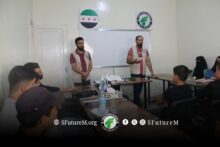
Introduction:
The new administration in Syria, following the fall of the Assad regime, faces significant challenges in rebuilding the economy and achieving stability. Regarding the free market, the new administration appears to be adopting more open and flexible economic policies. Reports indicate that the Syrian transitional government (or caretaker government) is working to stabilize the exchange rate and improve the value of the Syrian pound by increasing supply and reducing taxes and levies imposed during Assad’s era. Additionally, efforts are underway to secure essential goods and revitalize the economy by operating factories and service facilities.
The new administration is expected to continue strengthening the free market as part of its economic strategy, focusing on attracting foreign investments and improving the business environment to support sustainable economic growth.
In this context, Basil Hamooi, President of the Damascus Chamber of Commerce, confirmed that the new Syrian government has informed business leaders of its intention to adopt a free-market model and integrate the country into the global economy, marking a significant shift from decades of state-controlled economic policies.
About the Free Market:
In economics, the free market is defined as an economic system where the prices of goods and services are determined by the interaction of supply and demand without government intervention.
In this market system, individuals and companies enjoy the freedom to make their economic decisions, fostering competition and innovation.
Accordingly, the characteristics of a free market include:
- Price Freedom: Prices are determined by the interaction of supply and demand.
- Private Ownership: Individuals and companies have private ownership of assets and resources.
- Competition: Encourages competition among companies, fostering innovation and quality improvement.
- Individual Decision-Making: Individuals and companies make economic decisions based on their own interests.
In modern disciplines such as economic sociology and political science, the free market is studied as part of broader economic and political systems, analyzing its impact on society and the economic and political relationships between individuals and nations.
Some key aspects studied in economic sociology include:
- Social inequality: The free market is seen as potentially leading to significant social and economic disparities, benefiting the most competitive individuals and companies while others face poverty and marginalization.
- Social interaction: Examines how free markets influence social interactions among individuals and groups, including the formation of social identities and relationships between different social classes.
- Cultural changes: Analyzes how free markets impact cultural values and social practices, such as promoting individualism and consumerism and their effects on social solidarity.
- Government role: Discusses the role of governments in regulating free markets to ensure social justice, prevent monopolies and exploitation, and how public policies shape market dynamics.
- Economic environment: Studies the impact of free markets on the broader economic environment, including economic growth, financial stability, and employment.
Positives of the Free Market:
The advantages of the free market can be generally understood in economic contexts, while also considering the specificity of the Syrian situation. The general benefits include:
- Economic efficiency: The free market enhances efficiency by encouraging competition, leading to improved quality of goods and services and optimal resource utilization.
- Innovation: Companies are always driven to offer new products and services to maximize profits, fostering innovation and technological advancement.
- Wide choice: The free market provides consumers with a vast array of goods and services, giving them greater freedom of choice.
- Flexibility: It allows the market to adapt quickly to changes in supply and demand, contributing to economic stability.
- Investment promotion: The free market attracts investors by minimizing government restrictions, thereby boosting economic growth.
Positives of the Free Market in Syria
The specific benefits of the free market in Syria can be seen as follows:
- Economic Reconstruction: After years of conflict, the free market can aid in rebuilding the Syrian economy by attracting foreign investments and fostering economic growth.
- Improved Business Environment: By reducing government intervention, the free market can create a more transparent and efficient business environment, facilitating company operations and growth.
- Increased Employment: The free market can contribute to creating new job opportunities by encouraging companies to expand and invest in the local economy.
- Enhanced Living Standards: Through promoting economic growth and increasing competitiveness, the free market can improve citizens’ living standards by providing better goods and services at affordable prices.
- Integration into the Global Economy: The free market can help integrate Syria into the global economy, boosting international trade and bringing modern technology and expertise into the country.
Starting from these positives, encouraging governments to transition to a free market system requires a set of policies and measures aimed at liberalizing the economy and enhancing competitiveness. Some of these steps that governments can follow to achieve this include:
- Price liberalization: Governments remove or reduce price controls, allowing the market to set prices based on supply and demand, which helps improve economic efficiency and reduce market distortions.
- Privatization of state-owned enterprises: Governments sell state-owned companies to the private sector, enhancing efficiency and encouraging innovation and competitiveness.
- Improving the business environment: Governments streamline bureaucratic procedures and reduce administrative red tape, making it easier for businesses to start and grow.
- Trade liberalization: Governments remove trade barriers such as tariffs and restrictions on imports and exports, boosting international trade and attracting more foreign investments.
- Strengthening property rights: Governments ensure the protection of intellectual and physical property rights, encouraging individuals and businesses to invest and innovate without fear of losing their rights.
- Tax system reform: Governments reform the tax system to make it fairer and more efficient, encouraging investment and economic growth.
- Infrastructure development: Governments invest in infrastructure such as roads, ports, and communications, facilitating the movement of goods and services and enhancing economic competitiveness.
We believe that these steps could help create a more open and flexible economic environment, thereby enhancing economic growth and attracting investments.
Disadvantages of a free market for Syria:
On the other hand, implementing a free market system can have several disadvantages, both generally and in the specific context of Syria. Some of the main disadvantages we see in general are:
- Monopoly: A free market can lead to the emergence of monopolies, where a few companies dominate the market and set prices unfairly, reducing competition and harming consumers.
- Economic inequality: A free market may widen the gap between the rich and the poor, as individuals and companies that are more competitive benefit, while others suffer from poverty and marginalization.
- Market failures: The market can fail to allocate resources efficiently, leading to shortages of some goods and services or surpluses of others, which may require government intervention to correct these failures.
- Externalities: A free market may not reflect the true costs of certain economic activities, such as environmental pollution, leading to negative impacts on society and the environment.
The disadvantages of a free market in Syria, specifically, appear as follows:
- Monopoly and corruption: In Syria, due to the influence of the former Ba’athist mentality, the free market could lead to an increase in monopolies and corruption, where certain groups dominate the market and exploit the situation to gain unfair profits, further increasing the suffering of citizens.
- Price disparity: The free market may result in significant price differences between the local and global markets, burdening citizens and reducing their purchasing power.
- Bureaucracy and corruption: Bureaucracy and corruption could hinder the proper implementation of free market principles, preventing the expected benefits of this economic system from being realized.
- Freelance work challenges: Many Syrians rely on freelance work due to unemployment and the lack of job opportunities, but they face significant challenges such as unjust conditions and difficulties with financial transfers, increasing their economic hardships.
Economic alternatives to the free market:
There are several alternatives to the free market system that could be suitable for Syria, especially under the current economic and social conditions. Some potential alternatives include:
- Mixed economy: A mixed economy combines elements of the free market and government intervention. In this system, the market is allowed to operate freely in some sectors, while the government intervenes in other sectors to ensure social justice and provide essential services such as healthcare and education. This model can help achieve a balance between economic growth and social justice.
- Social economy: The social economy focuses on achieving a balance between economic growth and social justice. In this system, the government intervenes to ensure the provision of essential services for all and reduce economic gaps between different social groups. This model could be useful in Syria to ensure a fair distribution of resources and achieve sustainable development.
- Planned economy: In a planned economy, the government has significant control over economic activities and determines national priorities. This model can be useful during crises or to rebuild the economy after conflicts, as the government can direct resources to the most needed sectors and rebuild infrastructure.
- Cooperative economy: The cooperative economy relies on cooperation between individuals and businesses to achieve common economic goals, encouraging the creation of cooperatives and joint ventures that benefit society as a whole. This model could be useful in Syria to enhance social solidarity and achieve local development.
- Green economy: The green economy focuses on sustainable development and environmental protection, encouraging investments in renewable energy and environmental projects that help reduce pollution and conserve natural resources. This model could be beneficial for Syria to achieve sustainable development and protect the environment for future generations.
Each of these alternatives has its advantages and challenges, and the best choice depends on the current conditions in Syria and the government’s ability to implement the necessary reforms.
Conclusion:
To adopt a free market system in Syria, the new Syrian administration can follow some recommendations to ensure the achievement of the desired economic and social benefits while reducing potential challenges. Some of these recommendations, as seen by the Economic Office of the Syrian Future Movement, include:
- Strengthening the legal and regulatory framework, which can be achieved through:
- A. Establishing clear laws and regulations that govern the free market and ensure transparency and fair competition.
- B. Strengthening anti-corruption efforts to ensure that economic benefits reach all segments of society.
- Encouraging investment through:
- A. Providing tax and customs incentives to attract local and foreign investments, with a focus on vital sectors such as technology and renewable energy.
- B. Simplifying bureaucratic procedures to ease the process of starting and operating businesses.
- Supporting vital sectors by:
- A. Investing in infrastructure such as roads, transportation, and communications to support economic growth.
- B. Enhancing education and vocational training to develop the local workforce and make it competitive in the free market.
- Protecting vulnerable groups by:
- A. Social support programs through the establishment of social support programs for the most vulnerable groups to ensure they are not harmed by economic transformations.
- B. Ensuring access to essential services such as healthcare and education for all citizens, regardless of their economic status.
- Enhancing transparency and accountability through:
- A. An effective regulatory system to monitor markets and ensure compliance with laws and regulations.
- B. Involving civil society in monitoring government performance to ensure transparency and accountability.
- Encouraging innovation and sustainable development through:
- A. Supporting innovation by providing support for startups and innovative projects to enhance innovation and economic growth.
- B. Sustainable development and environmental protection to ensure a better future for future generations.
We at the Economic Office of the Syrian Future Movement believe that following these recommendations can help achieve the benefits of a free market and reduce potential challenges, contributing to sustainable economic and social development in Syria.
Economic Office
Research Team
Research and Studies Department
Studies
Syrian Future Movement
Conclusion:
- الزكاة والضريبة والجمارك تحدد قواعد وشروط إنشاء الأسواق الحرة في ….
- انعكاسات اقتصادية محتملة لـ”السوق الحرة” في سوريا – الحل نت.
- سوريا تتجه لتبني نظام اقتصاد السوق واستئناف قريب لعمل المطار.
- حكومة سوريا الجديدة تدعم التحول إلى اقتصاد السوق الحرة.
- اقتصاد السوق الحر – عنب بلدي.
- رجل الاعمال بلال ابراهيم يكتب : سوريا المستقبل: اقتصاد حر وعدالة تنموية ….
- مزايا وعيوب اقتصاد السوق. اقتصاديات السوق.
- ماذا يعنى اقتصاد السوق الحر وما هي مزاياه وعيوبه؟.
- e3arabiتجار سوريا يتلقفون إشارات إيجابية للتحوّل نحو الاقتصاد المفتوح.






